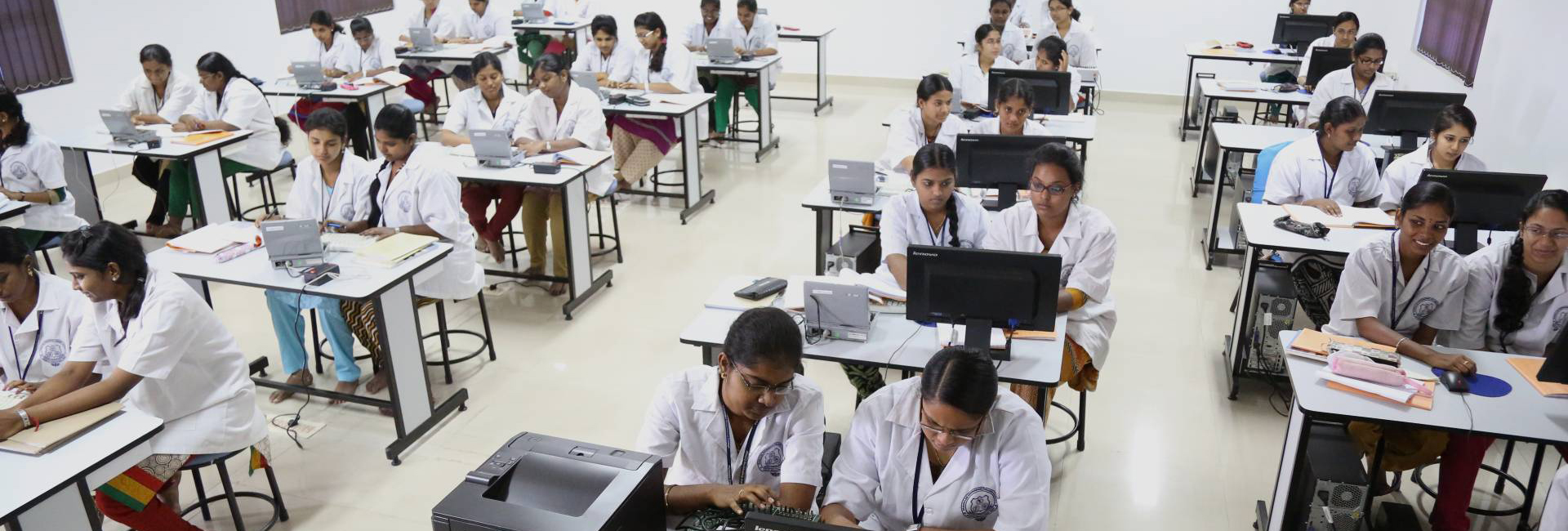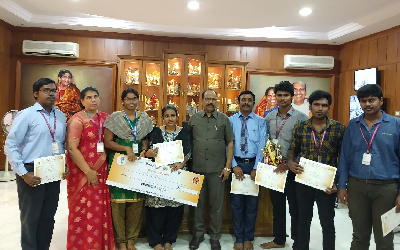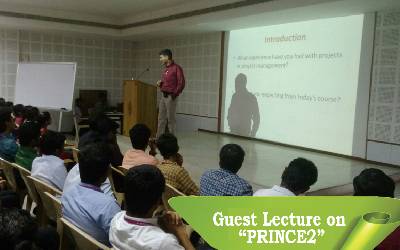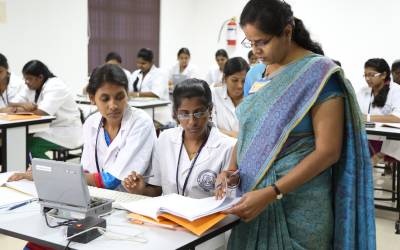
About the Department
Vision and Mission
PEOs, POs, PSOs
HOD Profile
Faculty List
Milestone
Professional Society
Club Activities
Events
Course Module
Newsletter and Magazine
Survey Forms
Gallery
About the Department
The Department of Information Technology, established in 2000, is recognized by AICTE and affiliated with Anna University. Accredited by NBA, the department offers a four-year degree program in Information Technology, renowned for its academic excellence. It has significantly contributed to transforming students into accomplished IT Professionals. The department boasts state-of-the-art facilities, including advanced laboratories, well-equipped seminar halls, smart classrooms, and a library that supports e-learning.
Our students gain substantial industry exposure through guest lectures and workshops led by industry experts. We also encourage students to participate in corporate in-plant training and industrial visits each semester, providing them with valuable real-world experience. Various value-added courses are offered to further enhance our students' knowledge. Motivational classes are held to encourage active participation in all aspects of their education.
To keep students engaged and refreshed, the Information Technology Expert Association Club, Computer Vision Club, Pervasive Computing Club, and Cyber Security Club organize various events. These events include quizzes, group discussions, presentations on innovation, mobile app development, and coding competitions. Additionally, we provide individual attention to nurture our students into responsible citizens who can contribute constructively to the industry and society.


Vision and Mission

VISION
To impart fundamental knowledge and practical expertise in Information Technology to students, instilling ethical principles to achieve excellence in academics and corporate, to emerge as distinguished graduates.
MISSION
- M1: To establish a strong foundation in technology through innovation and research.
- M2: To create a tech-driven learning environment that promotes academic success.
- M3: To develop skilled graduates in IT, research and entrepreneurship with global competence.
- M4: To collaborate with industry and government affairs to gain exposure while maintaining standards and promoting ethics, diversity and social impact.
Programme Educational Objectives(PEO)
Programme Outcomes (PO)
Programme Specific Outcomes (PSO)
HOD Profile

Dr.M.Helda Mercy, M.E, Ph.D
Professor and Head of the Department of Information Technology
She has 28 years of teaching experience and has got a proven record of academics strength which facilitates her to carry out her teaching field in an effective Manner. She has received her M.E degree in computer Science and Engineering from Sathyabama University and her PhD degree from University of Madras.
Her research area includes Graph Theory, Networking, Artificial intelligence, Machine learning, Computer Graphics and Mathematical Modeling. She has produced 1 research scholar. She has seven copy rights from government of India. She also acted as a Resource person in the orientation program conducted for newly recruited staff members of the department of Mathematics and Statistics in the government colleges of Tamil Nadu, She is also the Editor and reviewer for Journal Parallel and cloud computing.
She has published 25 international journals and presented and published papers in international conference (20) and national conferences (10) in India and abroad. She has received the best paper award in the International Conference organized by Loyola College, Chennai. Also she is a recipient of REV. FR. RACINE AWARD for her research publications. She has authored 5 books. She is the recipient of best Teaching Awards in Engineering to Department of Information Technology from STAFFORDSHIRE UNIVERSITY, United Kingdom, 2019.
Faculty List
| S.No. | Name of the Faculty | Designation |
| 1. |
Dr. S. Prasanna Devi |
Professor & Chief Academic Officer |
| 2. |
Dr. M. Helda Mercy |
Professor & Head |
| 3. |
Dr. D.Karunkuzhali |
Professor |
| 4. |
Dr. B.Buvaneswari |
Professor |
| 5. |
Dr. N. Bala Sundara Ganapathy |
Professor |
| 6. |
Dr. B. Karthikeyan |
Professor |
| 7. |
Dr. M. Sumithra |
Professor |
| 8. |
Dr. K. Sridharan |
Professor |
| 9. |
Dr. P. Latha |
Professor |
| 10. |
Dr. E.Thenmozhi |
Professor |
| 11. |
Dr. K. Ramadevi |
Professor |
| 12. |
Dr. K. Tamilarasi |
Professor |
| 13. |
Dr. I. Thamarai |
Professor |
| 14. |
Dr. M. Dilli Babu |
Associate Professor |
| 15. |
Dr. G.Dhanalakshmi |
Associate Professor |
| 16. |
Dr.K.Muthulakshmi |
Associate Professor |
| 17. |
Dr. K. Lalitha |
Associate Professor |
| 18. |
Dr.M. Jawahar |
Associate Professor |
| 19. |
Dr.K.Maithili |
Associate Professor |
| 20. |
Dr. L. Ramalingam |
Associate Professor |
| 21. |
Dr. Prabha |
Associate Professor |
| 22. |
Mrs. S. Mary Rexcy Asha |
Associate Professor |
| 23. |
Mrs. S. Uma |
Associate Professor |
| 24. |
Mr. S. Gopi |
Associate Professor |
| 25. |
Dr. S. Sharanyaa |
Assistant Professor |
| 26. |
Dr. Shaji D S |
Assistant Professor |
| 27. |
Mr.V. Kandasamy |
Assistant Professor |
| 28. |
Mrs. J. Hemavathy |
Assistant Professor |
| 29. |
Mrs. P.Prema |
Assistant Professor |
| 30. |
Ms. S. Anu Sherly |
Assistant Professor |
| 31. |
Mrs.R.Selvi |
Assistant Professor |
| 32. |
Mrs. V. Priyadarsini |
Assistant Professor |
| 33. |
Ms. P.Haritha |
Assistant Professor |
| 34. |
Mrs.A.Rekha |
Assistant Professor |
| 35. |
Mrs. P. Manjuleeswari |
Assistant Professor |
| 36. |
Mrs.V.Rajeswari |
Assistant Professor |
| 37. |
Ms.R.Suseendra |
Assistant Professor |
| 38. |
Mr. S.Sasidaran |
Assistant Professor |
| 39. |
Ms. S.Smitha Mol |
Assistant Professor |
| 40. |
Mrs. R. Sumathi |
Assistant Professor |
| 41. |
Mr.T.Ravi |
Assistant Professor |
| 42. |
Mrs. C. Rekha |
Assistant Professor |
| 43. |
Mrs. A. Divya |
Assistant Professor |
| 44. |
Mrs. Meenakshi Diwakar |
Assistant Professor |
| 45. |
Mrs.S. Jagadeeswari |
Assistant Professor |
| 46. |
Ms. Anandhi R |
Assistant Professor |
| 47. |
Mrs. H. Aarthi |
Assistant Professor |
| 48. |
Ms.T. Preetha |
Assistant Professor |
| 49. |
Mr. Aravindan G |
Assistant Professor |
| 50. |
Mrs.A.Deepika |
Assistant Professor |
| 51. |
Ms. R. Jayashree |
Assistant Professor |
| 52. |
Mrs. A.P. Shalini |
Assistant Professor |
| 53. |
Mrs.A.Sathya |
Assistant Professor |
| 54. |
Mr. R. Madhavan |
Assistant Professor |
| 55. |
Mrs.P. Girija |
Assistant Professor |
| 56. |
Mrs. K. Vijayalakshmi |
Assistant Professor |
| 57. |
Mr.K.Ramesh |
Assistant Professor |
| 58. |
Mr.Vigneshwaran S |
Assistant Professor |
| 59. |
Mrs. B. Jerina |
Assistant Professor |
| 60. |
Mrs. Linsia Raja winsy S T |
Assistant Professor |
| 61. |
Mr. Carmel. S |
Assistant Professor |
| 62. |
Mrs. Ambiga P |
Assistant Professor |
| 63. |
Mr. Prashanth M |
Assistant Professor |
| 64. |
Mrs.V.Chitra |
Assistant Professor |
| 65. |
Mrs.P.Edreena |
Assistant Professor |
| 66. |
Ms.S.V. Ruphitha |
Assistant Professor |
| 67. |
Mrs.L. Sagayadesdemona |
Assistant Professor |
| 68. |
Ms.K Haripriya |
Assistant Professor |
| 69. |
Mrs. Parameswari S |
Assistant Professor |
| 70. |
Ms. Yasodha k |
Assistant Professor |
| 71. |
Ms. Bhavani G |
Assistant Professor |
| 72. |
Mr. Balaji A |
Assistant Professor |
| 73. |
Mr. Hemal Babu |
Assistant Professor |
| 74. |
Mrs. Uma Maheswari N |
Assistant Professor |
First Year Faculty List
| S.No. | Name of the Faculty | Designation |
| 1 |
Mrs. Harina C |
Assistant Professor |
| 2 |
Mrs. Narmadha Devi |
Assistant Professor |
| 3 |
Mr. Sivakumar |
Assistant Professor |
| 4 |
Mrs. Ramya M |
Assistant Professor |
| 5 |
Mrs. Usha T |
Assistant Professor |
| 6 |
Mrs. Radha P |
Assistant Professor |
| 7 |
Mrs. Kalaiarasi S |
Assistant Professor |
| 8 |
Mr. Kishore |
Assistant Professor |
Milestone

Professional Society

CSI takes pride in being the largest and most professionally managed association of and for IT professionals in India. The purposes of the Society are scientific and educational directed towards the advancement of the theory and practice of computer science and IT.
IEEE and its members inspire a global community through highly cited publications, conferences, technology standards, and professional and educational activities, envisioning a sustainable future.


The Institution of Electronics and Telecommunication Engineers (IETE) is India's leading recognised professional society devoted to the advancement of Science and Technology of Electronics, Telecommunication & IT.
ICT Academy is an initiative of the Government of India in collaboration with the state governments and industries.

Events Organized
FDP/STTP Organized / Attended
Events Participated by Students
Course Module
Question Bank – Academic Year 2025-26 (Odd Semester)
| YR/SEM | SUBJECT CODE | SUBJECT TITLE | LINKS |
|
II Yr / III Sem |
23CS1302 |
Data Structures |
|
|
23CS1303 |
Database Management Systems |
||
|
23IT1301 |
Object Oriented Programming |
||
|
23IT1302 |
Microprocessor and Microcontroller |
||
|
23MA1301 |
Discrete Mathematics |
||
|
III Yr / V Sem
|
23IT1501 |
Automata Theory and Compiler Engineering |
https://sites.google.com/view/automata-theory-and-compiler-e/question-bank |
|
23IT1502 |
Web Technologies |
https://sites.google.com/view/iii-year-wt/home/question-bank |
|
|
23IT1503 |
Embedded Systems and Internet of |
https://sites.google.com/view/23it1503-embeddedsystemsandint/home |
|
|
23IT1504 |
Artificial Intelligence |
https://sites.google.com/view/artificial-intelligence-21it/home |
|
|
23IT1909 |
Ethical Hacking |
||
|
23GE1004 |
Hospital Waste Management |
||
|
23EC1011 |
Telehealth Technology |
||
|
23CS1909 |
Video Creation and Editing |
||
|
IV Yr / VII Sem |
21IT1701 |
Mobile Computing with mobile application development |
https://sites.google.com/view/21it1701-mcmad-labintegrated/home |
|
21CS1701 |
Cryptography and network Security |
||
|
21MG1701 |
Principles of Management |
||
|
21IT1904 |
Software Testing and Automation |
https://sites.google.com/view/21it1904-software-testing-and-/home |
|
|
21ME1008 |
Supply chain management |
Department Survey Forms
VAN MAHATSOV CELETBRATION
Mindarika visit
















